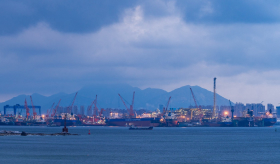-
Solution
Sinopec Achieves Global Milestone with First Cross-Border Refined Oil Trade Using Electronic Bill of Lading on TradeGo Platform
Recently, Sinopec Fuel Oil (Singapore) successfully completed the full paperless trade process for a transaction exporting 5,000 tons of light diesel oil from Singapore to Sri Lanka using TradeGo platform's "TradeDocs" solution. This marks the first time Sinopec has utilized a digital trade document solution in international trade, as well as the world's first instance of an electronic bill of lading (eBL) application for cross-border trade of refined oil products, signifying a milestone in the digital transformation process for the global energy and chemical trade industry.
In this transaction, the Singaporean shipowner first issued the eBL on the TradeGo platform. Upon receiving the eBL from the shipowner online, Sinopec Fuel Oil (Singapore) Pte. Ltd., along with a complete set of electronic documents including the certificate of origin, quality certificate, and cargo manifest, sent them to the importer in Sri Lanka. The importer, after receiving the documents, successfully completed the import customs clearance process in Sri Lanka and returned the eBL online to the shipowner as soon as the goods arrived at the destination port, successfully taking delivery of the cargo and completing the entire transaction process.

The near-sea transport from Singapore to Sri Lanka typically only takes 5-6 days. Using traditional paper bills of lading for documentation and cargo collection not only increases the risk of damage or tampering, adding uncertainty and risk to the trade process, but also requires a significant amount of manual handling, including the printing, signing, mailing, and acceptance check of the documents. This process significantly exceeds the short-sea voyage duration, often leading to cargo being detained at the port, delivery delays, and higher delivery risks and costs for all parties involved. Even using WoT/LoI to substitute for the original bills of lading requires offline signatures from all parties, which cannot ensure immediate cargo collection upon arrival. Moreover, letters of guarantee are not documents of title, posing additional risks regarding property rights.
To address these issues, TradeGo, leveraging its mature experience in the digitalization of international trade documents, innovatively adopted the "Digital Document" solution in collaboration with Sinopec Fuel Oil (Singapore). Practice has proven that the use of digital documents, such as eBLs, can significantly reduce document processing time, ensure the secure and controllable circulation of trade documents, and streamline the short-sea trade operation. Furthermore, it can reduce enterprises' reliance on paper documents, practicing the concept of green trade. Under the context of the economic globalization, trade digitalization is not only an inevitable choice to keep up with the times but also a key force in promoting progress and innovation in international trade. This relies not only on technological advancements but also on the collective pursuit of efficiency improvement, risk control, process optimization, and environmental responsibility among global trade participants.
Currently, Sinopec Fuel Oil (Singapore) continues to use TradeGo platform for trade documentation in its business of exporting refined oil products to Sri Lanka. As the collaboration deepens, this scenario can be further expanded along the trade and logistics chains, allowing more participants in the energy and chemical industries to enjoy the convenience brought by digitalization. Additionally, both parties will jointly explore more sustainable digital trade innovation scenarios, providing valuable practical experience and reference cases for the digital transformation of the energy and chemical trade industry, and embracing the challenges and opportunities of the digital age.

Scan the code to follow







